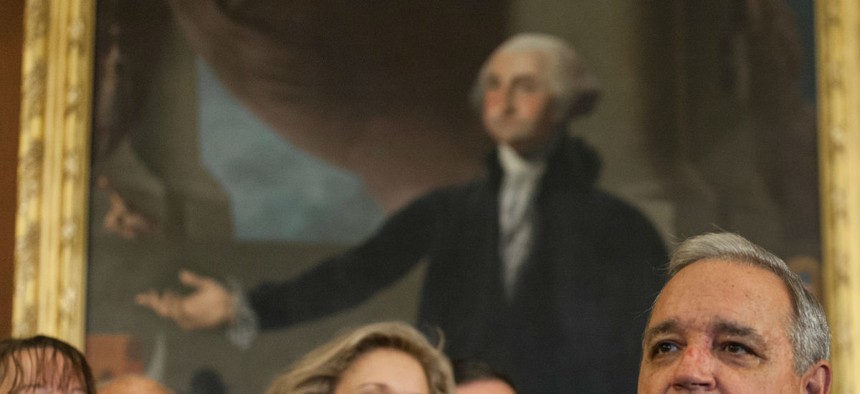VA Bonuses Targeted Again
New legislation would give secretary authority to rescind employee performance awards.
The secretary of the Veterans Affairs Department would have clear authority to order employees to repay bonuses under legislation introduced Monday in the House.
H.R. 280 would require notifying affected employees before they had to repay the money, and would give them an opportunity for a hearing conducted by the secretary. But the secretary’s decision would be final and not subject to review by “any other agency or any court,” according to the text of the bill. The idea is to give the VA chief another tool to punish those engaged in misconduct – in this instance by allowing the department to rescind bonuses those employees have received. But the legislation does not specify criteria that would be grounds for ordering a repayment, giving the secretary broad discretion. The bill also is aimed at clearing up any confusion over whether VA has the authority to claw back bonuses.
House Veterans’ Affairs Committee Chairman Jeff Miller, R-Fla., the bill’s sponsor, introduced similar legislation during the last Congress. A bipartisan group of senators introduced a measure in July during the 113th Congress that specifically targeted bonuses given to VA employees found guilty of manipulating patient wait list data – the action that sparked the start of a massive management overhaul last year at the department.
“Ideally, VA employees and executives who collected bonuses under false pretenses should be subject to prosecution when warranted, but at a minimum their bonuses should be paid back in full,” said Miller in a statement on H.R 280. “I urge my colleagues to support this bill so the VA secretary will have another tool to instill some much-needed accountability throughout the department.”
Then-VA secretary Eric Shinseki in May rescinded an $8,500 performance award given in 2013 to Sharon Helman, a bonus that the department said was awarded because of an administrative error. Federal employee advocates as well as department officials, however, have questioned whether the agency actually has the authority to rescind an employee bonus for malfeasance. Helman, the former career senior executive who ran VA’s Phoenix health care system when the scandal over falsifying wait lists erupted last spring, was fired in November, and then appealed her case to the Merit Systems Protection Board. Chief Administrative Judge Stephen C. Mish in December upheld Helman’s firing because she improperly accepted more than $13,000 in gifts from a lobbyist and failed to report them, not because she engaged in misconduct related to manipulating data to conceal excessive wait times for vets seeking health care.
Before resigning in May, Shinseki also prohibited any performance awards for the Veterans Health Administration’s senior executives in 2014.
Last year, a USA Today report found the VA awarded $380,000 in bonuses to “directors and top executives” at 38 hospitals currently under investigation for falsifying records.
Bonus money isn’t the only compensation that some lawmakers are targeting in a push to crack down on misconduct and deter bad behavior at the VA. In November, Miller said he intended to introduce a bill that would prevent senior executives about to be fired from instead opting to retire with full benefits. Such a measure would allow the VA secretary to take away the government contribution portion of the pension for the time period in which the employee was engaged in behavior warranting removal.
Miller has not yet introduced that bill; draft legislation is still being hammered out, according to a committee aide.
NEXT STORY: Bills Would Give Feds a 3.8 Percent Pay Raise




